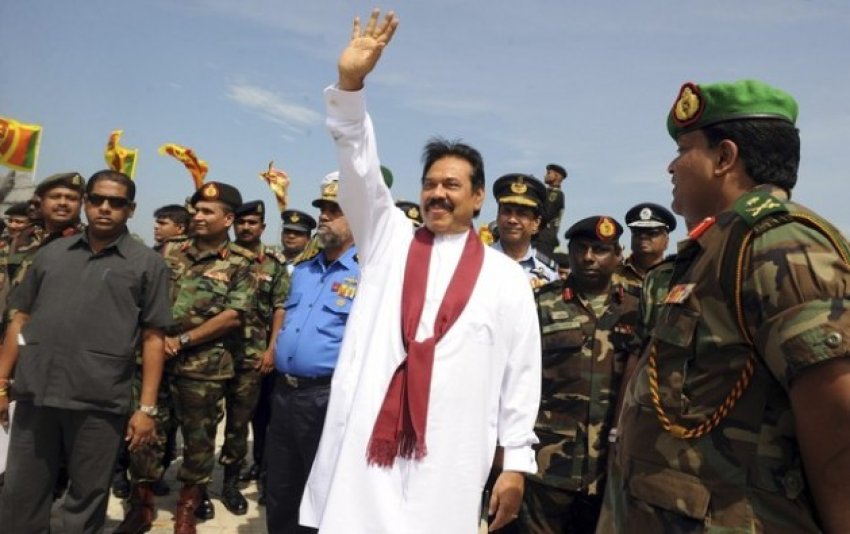
Dr Paikiasothy Saravanamuttu, executive director of the Centre for Policy Alternatives in Sri Lanka, gave a talk on “The challenge of moving from post-war to post-conflict in Sri Lanka” at a June 21 meeting held in the Darebin Intercultural Centre in Melbourne. The following is a summary of his talk compiled by Michael Cooke.
* * *
The end of the war [between the Sri Lankan state and the Liberation Tigers of Tamil Eelam in 2009] does not mean the end of conflict. The guns are silent, but the sources of conflict remain, and are being reproduced.
New sources of conflict are being created. The idea of Sri Lanka as a multi-ethnic, multi-religious, democratic society is under attack.
The first thing one notices when one leaves the international airport at Colombo is the large cut-out displayed with the image of President Mahinda Rajapaksa; Buddha's image receives secondary importance at the airport entrance. Rajapaksa's deification is second only to the family that runs North Korea.
The president has authorised an additional six chapters to the Buddhist chronicles (Mahavamsa) of the Sinhala people [the island's ethnic majority]. These books were written in Pali (an ancient language no longer in use) and largely sang the praises of their kings and their divine mission to rule the island on behalf of the Sinhalese elite.
The first three new chapters will update the historical record up to the ascension of Rajapaksa to the presidency. The next three will chronicle the reign of the president and his defeat of the Liberation Tigers of Tamil Eelam.
There are about 200 to 300 individuals in key positions in the political and economic sphere who owe their allegiance to the ruling family.
The Rajapaksa regime cannot afford to give up power because there is no immunity from prosecution for war crimes and corruption. Successor regimes, given the country’s history, would be harsh on the participants of the Rajapaksa regime.
The military has become a major player in the island’s economy and politics. Militarisation is particularly acute in the predominantly Tamil north and east of the country.
For example, at any social event held in the predominantly Tamil city of Jaffna, the army must be invited as guests. In the Northern Provincial Council elections held last year, the army supported candidates of Rajapaksa's United Peoples Freedom Alliance. (Despite this, the UPFA lost the election).
The role of the defence ministry has been enlarged to encompass urban development. The military has played a part in the evictions of the poor, especially on Slave Island (a suburb of Colombo).
New military camps and bases have been built. There is a military presence in all the districts of Sri Lanka. If there is a problem of law and order, the military is called in to pacify the situation.
Legitimate protests made by students and fisherfolk over their conditions are violently subdued by the military. All the country’s military activities are connected to the Rajapaksa family, as the president’s brother is the defence minister.
The checks and balances on executive power are almost non-existent. The constitution has been amended to remove the presidential limit of two terms. The independent commission that oversees elections has been abolished and elections are now under the purview of the president.
The chief justice was impeached by the regime in blatant disregard of the rule of law. Her replacement is a supporter of the regime. The three lawyers working on the defence of the impeached chief justice were subjected to death threats.
The government has proscribed about 40 Tamil diaspora groups and banned 440 individuals from taking part in the civic life of the country.
Right-wing Sinhalese Buddhist groups are supported by key individuals in the regime and have harassed Christians and Muslims with impunity. This has resulted in the erosion of the rule of law, and makes a mockery of the principle that everyone is equal in the eyes of the law.
These groups are present in all the organs of the state, intimidating those they see as traitors to what they perceive to be the Sinhala Buddhist heritage of the country. They ignore the fact that Sri Lanka has always been a multi-faith and multi-ethnic community.
The Sinhala Buddhist majority community has reacted in two ways. One group approves of the government's activities, while a larger group are too scared to break out of the current hegemony, and try to survive within the constraints of the status quo.
The degeneration of the traditional left can be seen by the craven behaviour of an old stalwart of the left Vasudeva Nanayakkara in relation to the president. When he greets Rajapaksa, he bows so low his nose almost touches the tarmac.
There are left groups that oppose the Rajapaksa regime, but they are weak.
There have been perceptible changes in the Tamil community in the north and the east, since the end of the civil war in 2009.
Trauma, as a result of the war and the ongoing human rights violations, and the corrupting influence of military occupation, have had an effect on social behaviour. There is a rise in teenage pregnancies, a marked rise in alcohol usage among young men and of suicides amongst those who cannot make a living.
Lastly there is tension between the Hindus and Christians.
China is the main foreign player in Sri Lanka. It has lent a lot of money, at commercial interest rates, to the government for big projects. The money owed will keep the country in hock for generations. Also, the Chinese government saved the ruling family from the danger of being put on trial at the Hague.
The economic future of the country is not bright. The rates of growth and the type of growth will not be sufficient to pay the country’s debt, nor pay for the bloated military and security apparatus, while also raising the population's standard of living.